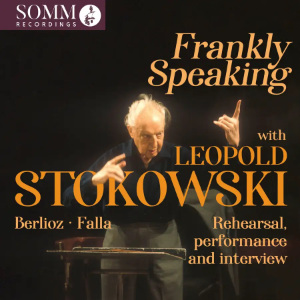
Frankly Speaking with Leopold Stokowski
Rehearsal, performance and interview
Manuel de Falla (1876-1946)
El amor brujo, ballet (1916 rev 1924)
Hector Berlioz (1803-1869)
Le carnaval romain, Op 9 (1843)
Rehearsals of El amor brujo and Le carnaval romain
‘Frankly Speaking’ BBC interview
rec. 15 September 1964, live at the Royal Albert Hall, London (de Falla); 19 December 1952, War Memorial Opera House, San Francisco (de Falla and Berlioz, rehearsals); 25 August 1959, BBC Studios, London (Frankly Speaking)
Somm Ariadne 5035 [75]
This is a three-in-one release. There’s a rehearsal sequence from San Francisco in 1952, a 1964 Royal Albert Hall performance of El amor brujo – these have been issued before – and finally a 1959 BBC Home Service interview with Stokowski, which appears for the first time.
El amor brujo has been reissued before on ICA Classics, a biggish Stokowski box, though had first appeared in a single disc on BBCL 4005-2 coupled with Beethoven’s Seventh Symphony and Britten’s Purcell Variations. It was a piece for which Stokowski had a real affinity – spicy, colouristic, driving, virtuosic and occasionally teetering on the edge of melodrama. He’d first recorded it with Nan Merriman in 1948 in New York, but any previous taping has to cede to this BBC one, which – despite the famously cavernous sonics – comes across with tremendous immediacy and conviction. The BBC Symphony plays with enormous character responding to Stokowski with vibrant intensity, whether in the work’s darkness or portentousness, or in its richly voiced legato elements. The Danza del terror is precisely that, whilst the rapt string cantilena in El círculo mágico offers expressive counter-balance. The tightly focused brass do themselves proud as, indeed, does soprano Gloria Lane who sounds mezzo-like in her throaty engagement with the music in her four episodes, each full of personality. Above all, there is Stokowski unravelling the sunrise lyricism of the final panel with great perception. His is certainly a particular view with some unconventional tempi, but it brings the piece wonderfully to life.
One can experience him rehearsing it twelve years earlier with the San Francisco Symphony. He knew the rehearsal was being broadcast by KNBC – the rehearsal survives because it was recorded on a station acetate – and so was on his best behaviour. It’s been released before, but not in as good sound as here. As Jon Tolansky writes in his booklet notes, and he should know as he played under Stokowski, there could be exceptionally tense scenes when Stokowski, the Marylebone Mauler, was in tyrannical mode. He chats quite affably and with droll irrelevance about the Spanish, but he’s getting the players in the mood for a series of pleasantly voiced strictures – diminuendos and articulation and he even whistles the melodic lines. In the Berlioz rehearsal he demands that the bows bounce on the string a little, insists that the trombones have ‘no space’ in a particular passage and wonders how to persuade them to make a glissando that they clearly don’t want to make. He also prioritises dynamics. These rehearsal segments don’t give us the full Stokowski, who would have been far more biting and implacable had these sessions not been recorded, but they provide useful evidence of his meticulous craftsmanship.
‘Frankly Speaking’ was a BBC interview series that ran to around one hundred programmes. As opposed to the scripted and stilted kind of programmes to which one is used from around this time, the freewheeling nature of this programme is genuinely refreshing. Stokowski’s interlocutors are John Bowen, George Scott and the conductor Reginald Jacques, the programme lasts 29 minutes and was first broadcast on 5 July though Somm’s date of transmission is noted as 25 August, so perhaps this was a repeat broadcast. Topics covered concern ‘misunderstandings’ about Stokowski, the creative process, the Showman Conductor, the film Fantasia and how it arose and Stokowski’s wish that Picasso had been involved. He admits that he loves the music of Bruckner but knew he couldn’t conduct it well so preferred not to conduct it at all. He takes gentle exception to Jacques’ comment that being a conductor is a ‘job’ and half-concedes that he is a humanist. To add to the jollity, when asked what his father did – one can feel the boredom and frustration descending on Stoky, a man who generally looked only forward – he announces without a blanch that he was a palaeontologist (he was actually a cabinetmaker) and that his mother ‘was a woman’. Typical Stokowski. At least he admits he had been born in London. It’s an enjoyable, unscripted and free discussion, the conductor more than holding his own and protecting his mystique.
If you’ve got the Falla broadcast, though, this is really a niche purchase. If you don’t have it, the Falla is a fiery and fascinating example of Stokowski’s conducting, with two adjuncts in the rehearsals and the previously unreleased radio broadcast to add biographical or psycho-crypto-biographical ballast.
Jonathan Woolf
Buying this recording via a link below generates revenue for MWI, which helps the site remain free



















